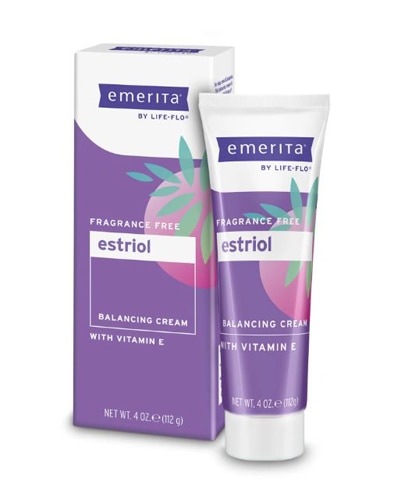If you’ve struggled, or are struggling, with
menopause, some studies have found that black cohosh may provide relief for many of your discomforts.
† A member of the buttercup family, this tall, flowering plant grows in the shady woods in eastern areas of North America. More than two centuries ago, Native Americans discovered that the root of the black cohosh plant (
Actaea racemosa, formerly known as
Cimicifuga racemose) helped relieve menstrual cramps and temporary menopausal discomforts, such as hot flashes, irritability, mood swings and sleep disturbances.

Native Americans helped introduce the herb to the European colonists, who incorporated the herb into their formulations. Black cohosh preparations are made from its roots and rhizomes, which contain a number of glycosides, flavonoids and terpenes. These days it is still used in a similar manner, as an adjunct for easing hot flashes, body pain, fatigue and mood issues associated with menopause.
How exactly does black cohosh work? Some
studies suggest that it binds to the body’s opioid receptors, promoting a pain-easing effect.
† While there is a lack of consistent evidence that proves benefit from black cohosh for menopause symptoms, in one
review of eight clinical trials, black cohosh significantly reduced depression and anxiety in all the studies reviewed.
†
Although there is much more research to do on this powerful herb, especially regarding its long-term side effects, black cohosh has a long history of safety. Because of its relaxing effect on the uterine muscles, however, it is not recommended for women who are pregnant or nursing.
†
How to take Black Cohosh for Menopause
Choose organic
There are many different varieties of black cohosh, as well as preparations, and they are not interchangeable. Some commercial black cohosh products have been found to contain the wrong herb or to contain mixtures of black cohosh and other herbs that are not listed on the label. To ensure that you’re buying a safe, quality product, try purchasing organic black cohosh from reputable companies that have been independently verified by a third party such as ConsumerLab, U.S. Pharmacopeia or NSF International.
Research and talk to your healthcare provider
If you are worried about long term ramifications of taking black cohosh, in clinical trials, people have taken black cohosh for as long as 12 months with no serious harmful effects. The standard black cohosh dosage is 40 mg to 128 mg of extract daily for up to 12 months. Still, it’s not recommended for use over a year and should be taken appropriately.
†
Be aware of potential side effects
Black cohosh can cause some mild side effects, such as stomach upset, cramping, headache, rash, a feeling of heaviness, breast pain, vaginal spotting or bleeding and weight gain.
Take precaution if you have liver disease
Extra precaution should be taken if you have liver disease, as there is some controversy as to whether black cohosh might harm the liver. Do not take black cohosh if you are taking other herbs or supplements that can harm the liver.
Consider synergy with other herbs
When black cohosh is combined with other herbs such as dong quai, evening primrose, hops, Korean ginseng, gingko, linseed (flaxseed), red clover, St John's wort, wild yam or passion flower, the synergistic effects on menopause can be even more pronounced.
Four combination menopause support formulas you can try include the following:
This targeted blend of nutrients and minerals for menopause includes black cohosh, plant sourced enzymes for digestion and high-potency vitamin B complex to support cellular function.
† $31, vitacost.com
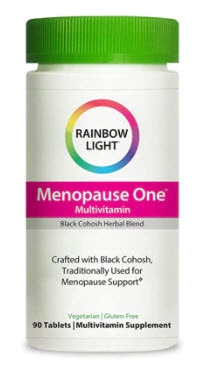
This formula includes black cohosh, dong quai for blood health, passionflower for healthy sleep, red raspberry for overall menstrual health and wild yam for a healthy inflammatory response.
† $10, vitacost.com
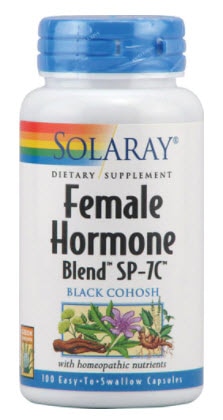
This proprietary blend of red clover, chaste tree berry and St john’s wort, help support the body to maintain equilibrium throughout menopause.
† $24, vitacost.com
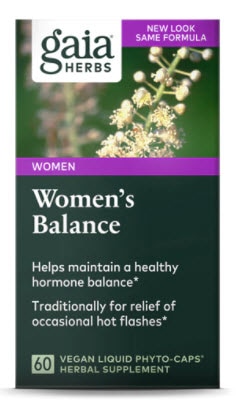
This formula features an all-star lineup of herbal heavyweights for menopause: Dong quai, black cohosh, wild yam and ginseng.
† $10, vitacost.com
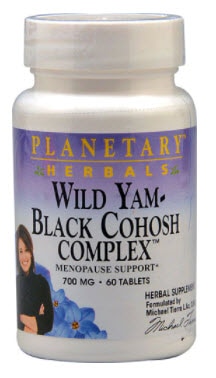 †These statements have not been approved by the Food and Drug Administration. These products are not intended to diagnose, treat, cure or prevent disease.
†These statements have not been approved by the Food and Drug Administration. These products are not intended to diagnose, treat, cure or prevent disease.
 Native Americans helped introduce the herb to the European colonists, who incorporated the herb into their formulations. Black cohosh preparations are made from its roots and rhizomes, which contain a number of glycosides, flavonoids and terpenes. These days it is still used in a similar manner, as an adjunct for easing hot flashes, body pain, fatigue and mood issues associated with menopause.
How exactly does black cohosh work? Some studies suggest that it binds to the body’s opioid receptors, promoting a pain-easing effect.† While there is a lack of consistent evidence that proves benefit from black cohosh for menopause symptoms, in one review of eight clinical trials, black cohosh significantly reduced depression and anxiety in all the studies reviewed.†
Although there is much more research to do on this powerful herb, especially regarding its long-term side effects, black cohosh has a long history of safety. Because of its relaxing effect on the uterine muscles, however, it is not recommended for women who are pregnant or nursing.†
Native Americans helped introduce the herb to the European colonists, who incorporated the herb into their formulations. Black cohosh preparations are made from its roots and rhizomes, which contain a number of glycosides, flavonoids and terpenes. These days it is still used in a similar manner, as an adjunct for easing hot flashes, body pain, fatigue and mood issues associated with menopause.
How exactly does black cohosh work? Some studies suggest that it binds to the body’s opioid receptors, promoting a pain-easing effect.† While there is a lack of consistent evidence that proves benefit from black cohosh for menopause symptoms, in one review of eight clinical trials, black cohosh significantly reduced depression and anxiety in all the studies reviewed.†
Although there is much more research to do on this powerful herb, especially regarding its long-term side effects, black cohosh has a long history of safety. Because of its relaxing effect on the uterine muscles, however, it is not recommended for women who are pregnant or nursing.†



 †These statements have not been approved by the Food and Drug Administration. These products are not intended to diagnose, treat, cure or prevent disease.
†These statements have not been approved by the Food and Drug Administration. These products are not intended to diagnose, treat, cure or prevent disease.



